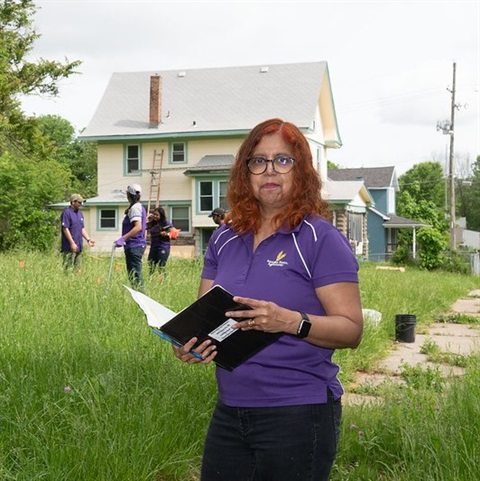K-State researcher to focus lead research in Kansas City, Kan.
Published on November 20, 2024

By Pat Melgares, K-State Research and Extension news service
MANHATTAN, Kan. – A Kansas State University professor whose innovative work in studying lead levels in urban neighborhoods led to recommendations for affordable soil amendments will now focus her work in an area of Kansas City that one local government official says “has experienced historic redlining and legacy pollution.”
Ganga Hettiarachchi, a K-State professor of soil and environmental chemistry, received nearly $800,000 from the U.S. Department of Housing and Urban Development to identify cost-effective soil amendments and reduce the impact of elevated lead levels in Kansas City, Kansas.
“We began researching this topic in 2022 by conducting field studies on urban neighborhood properties in Kansas City, Missouri,” Hettiarachchi said. “This new study will build on the results of the earlier work by exploring the most promising soil amendments in depth, and looking into more affordable and accessible testing methods to estimate bioavailable lead in amended soils.”
Alyssa Marcy, the long range planner for the Unified Government of Wyandotte County and Kansas City, Kansas, said lead is the most common contaminant found in that part of the city.
“And it’s often associated with a higher rate of homes built prior to 1978, which indicates the use of lead paint and other components, and our proximity to major highways and the former ubiquitous use of lead gasoline,” Marcy said.
Northeast KCK, a historically black community, experiences the highest number of vacant or abandoned lots in the Kansas City metro area – in fact, the majority of the city’s 4200 vacant lots are in northeast Kansas City, according to Marcy.
“That is not only a challenge to human and environmental health, but it can hinder development in these areas, which our communities desperately need,” Marcy said.
Hettiarachchi’s work will begin in January, 2025.
“We’ll be taking our lab research into field-based, technical feasibility studies to evaluate their relative effectiveness, cost and the community’s acceptance of several soil amendments used to bind lead in soil,” she said.
In 2021, the U.S. Centers for Disease Control and Prevention estimated more than 500,000 U.S. children under age 6 have blood lead levels higher than 5 micrograms per deciliter, which at that time was the level at which recommended public health actions be initiated (currently, the level is at 3.5 micrograms per deciliter).
Lead exposure can stunt childhood brain development, as well as cause damage to the brain and nervous system in children and adults, among other health risks.
“The lack of adequate field studies and the urgent need for science-based knowledge concerning the effectiveness of urban soil lead interventions has been recognized in a survey on the topic,” Hettiarachchi said.
“The fact that, according to the CDC, there is no safe exposure level for lead in children requires researchers, public health experts and policy decision-makers working together towards finding practical approaches to further reduce lead exposure for children.”
Marcy said the partnership between the Unified Government and Kansas State University includes education and engagement with the community, and includes Groundwork Northeast Revitalization Group (which advocates for social and environmental justice in northeast KCK) and other local neighborhood groups.
“It is important for this work to continue informing residents about the issues surrounding lead – what it is, why it matters and what can be done to address our community’s health outcomes and chronic environmental injustices,” Marcy said. “Participating in this study will not only position KCK to be on the forefront of an innovative solution, but it could also help our community heal and prepare for the necessary development we need to thrive.”
Additional partners in the project include the U.S. Environmental Protection Agency, Wyandotte County Public Health Department, City of Kansas City (Missouri) Health Department, and the City of Kansas City (Missouri) Department of City Planning and Development.

K‑State Research and Extension is a short name for the Kansas State University Agricultural Experiment Station and Cooperative Extension Service, a program designed to generate and distribute useful knowledge for the well‑being of Kansans. Supported by county, state, federal and private funds, the program has county extension offices, experiment fields, area extension offices and regional research centers statewide. Its headquarters is on the K‑State campus in Manhattan. For more information, visit www.ksre.ksu.edu. K-State Research and Extension is an equal opportunity provider and employer.
More information: Ganga Hettiarachchi, 785-532-7209, ganga@ksu.edu; Alyssa Marcy, 913-573-5755, amarcy@wycokck.org
Related: K-State Department of Agronomy
Have concerns about lead today?
If you are concerned about your household having lead, learn more about our program with the Wyandotte County Public Health Department that can bring many resources to your home.
Learn more